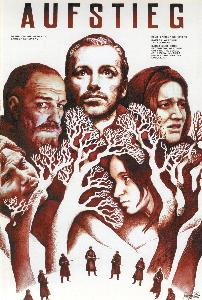“The Ascent” is a Soviet film by Larisa Shepitko. This was her last movie before she died in a car accident. She was obsessed with making a movie based on the novel Sotnikov by Vasil Bykav. It is a story of collaboration and betrayal. She heavily edited the screenplay. She insisted in making the movie under terrible winter conditions to conform to the script. The set was snowy and at times as cold as 40 degrees below zero. Frost bite was a problem. The actors and crew suffered for their art, but Shepitko was already suffering from ill health. The result was a movie that was the Soviet nominee for Best Foreign Language Film for the Academy Awards. It did not make the cut, but should have.
The movie opens with a firefight between Soviet partisans and German soldiers during the Great Patriotic War, but this is not going to be a combat film. It has higher aspirations. The partisan unit is starving, so two men are sent to forage some food. They take a goat from a collaborator’s farm, but an encounter with a German patrol results in the wounding of Sotnikov (Boris Plotnikov). He and Rybak (Vladimir Gostyukhin) take refuge with a woman named Demchikha (Lyudmila Polyakova), who has three young children. You can imagine her fear for her family, considering the two have left a snow path directly to her door! Not surprisingly, they are discovered by the Germans and taken captive. At the German compound, they are interrogated by the local collaborator Portnov (Anatoli Solonitsyn). Before the war he was a choir director, but war brings out the worst in people so now he is a slimy, sinister Nazi ass-kisser. He tortures Sotnikov, but he refuses to talk. Rybak, on the other hand, …
Shepitko’s directorial career was tragically cut short, but she left us this remarkable film. It is a real cinephile’s dream. The cinematography is noteworthy. Some of it is hand-held and the cameraman is struggling through the snow along with the actors. The music is sparse, but effectively augments the scenes it is used in. The acting is outstanding and this is impressive since Shepitko insisted on a cast of unknowns. The best performance was by Plotnikov and this was his debut! Gostyukhin is good as well. The movie is very micro in its concentration on the pair. It’s clear they are playing the roles of Jesus and Judas. Portnov becomes the poster boy for collaborators and is one of the great villains in Soviet war cinema. He goes from party loyalist to model fascist. Shepitko opens and closes the movie with telephone poles symbolizing crucifixes. The final scene is clearly meant to evoke images of Golgotha. The Christian symbolism was the reason why the movie was almost nixed by Mosfilm, Shepitko’s husband (the director who later made “Come and See”) went over its head to a high Communist official who was won over in a private screening. While the religious theme is subtle, the anti-collaborator theme is not. The movie is more anti-collaboration than anti-Nazi. However, it is not a propaganda film. Portnov is loathsome, but Rybak is not evil. He is a tragic figure and you have to wonder what you might have done in his situation. The movie is admirably thought-provoking in that respect.
Soviet cinema made some excellent war films. “The Ascent” is one of the best. It is a must-see if you like Soviet war films.
GRADE = A

saw the film and loved it, a somewhat bleak but memorable watch.
ReplyDelete